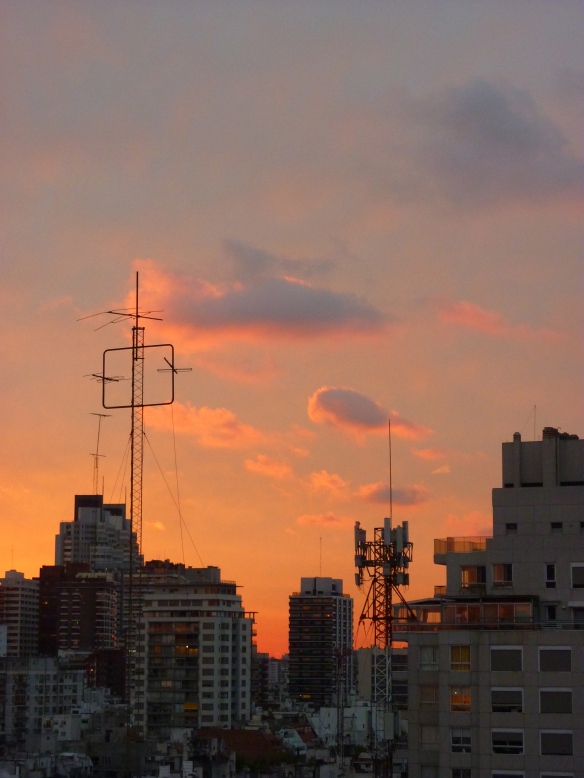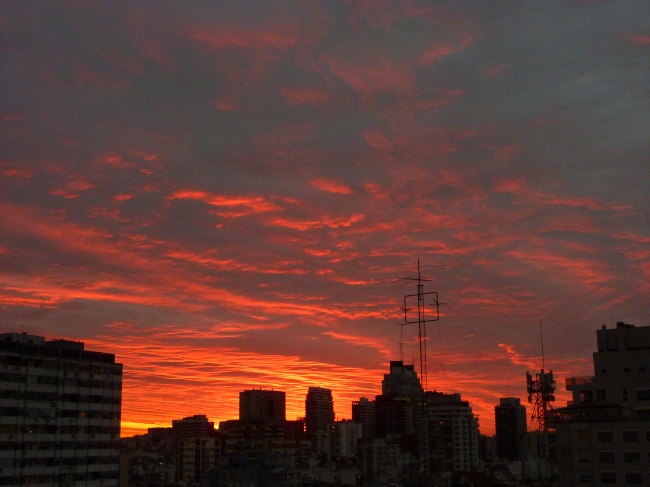This New Year’s Eve was my quietest one in years. While I had plans to spend it with friends, I ended up being sick on the 31st, so decided to stay home. In the end, I was quite glad I did. I spent a quiet night reflecting on my year, before watching the city erupt in fireworks from my balcony.
Buenos Aires doesn’t really do one big organised fireworks display, like Sydney, or London or New York. Instead, everyone lights off their own fireworks, from their rooftops, balconies and the street. It was quite a magical sight seeing the night sky light up all over the place, including right in front of my balcony. While I do feel this is a little unsafe, and quite cruel to the thousands of dogs in the city (especially considering the fireworks last a good hour, with random ones going off for at least another 2 hours), I can’t help but get swept up by the magic of fireworks.
So as I stood watching the colourful twinkling erupt over the skyline, I took a moment to look back on my year. 2014 was packed with a number of incredible moments and learning experiences.
After accumulating too much stress and anxiety through two years of my Master’s degree, whilst juggling a few jobs, I decided on a bit of a whim to move to Buenos Aires, a city I’d been dreaming about visiting for years. My doubts were quickly eased as I slipped into life here and it quickly became home.
Along the way I’ve had the opportunity to travel within Argentina, to Uruguay and Brazil (ok, I hopped across the border for a few hours – it still counts!). I’ve made amazing friends from around the world, who have become like family. I have two Argentine families who have provided me with so much support here, making my time that much easier, and giving me the security of knowing that I have people to call in case of any emergency.
I’ve celebrated birthdays, farewells, Thanksgiving and Christmas. I’ve met so many interesting people with incredible stories. I’ve found a job that I absolutely love and that allows me to combine two of my biggest loves: travel and writing. I’ve been learning Spanish (an ongoing process), and I’m even taking lessons at long last (word of advice – unless you’re very good at picking up languages, you don’t just learn a language by osmosis. You do need to study). I’ve learnt so much more about Argentine culture and history, about the customs and cultures across the rest of South America, I’ve tried new foods, new drinks, new dance styles, listened to new music, encountered different viewpoints and lived outside my comfort zone. I’ve learnt to be be present, to appreciate each moment and to really embrace life to the fullest. Most of all, I’ve learnt to be really grateful for all I have, and the amazing people I have in my life, here, back in South Africa, and scattered around the globe (shout out to my wanderlusting friends on their own journeys in far-off places).
I can’t really put into words how wonderful and meaningful this year has been for me and how much I’ve experienced. It’s been chaotic at times and I’ve worked extremely hard, and slept very little, but it has all been worth it. I’m content and happy, and that is a beautiful thing. So thank you to 2014 for the lessons and opportunities.
2015 promises to be an exciting year as well. I’ll be going back to South Africa for a a month, before travelling to Brazil, then back to Argentina. I have a number of exciting projects lined up, and many travel plans.
To all who read my tiny corner of the internet, a very happy new year to you! May 2015 bring you all much happiness, and plenty of exciting experiences!



